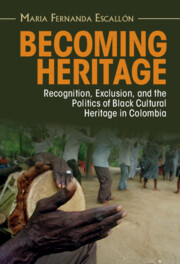Book contents
- Becoming Heritage
- Afro-Latin America
- Becoming Heritage
- Copyright page
- Dedication
- Contents
- Figures
- Preface
- Acknowledgments
- Abbreviations
- Introduction
- 1 A New Framework of Legitimacy
- 2 Institutionalizing Heritage
- 3 Heritage in the Face of Death
- 4 Palenqueras and the Trap of Visibility
- Epilogue
- Bibliography
- Index
Epilogue
Published online by Cambridge University Press: 06 April 2023
- Becoming Heritage
- Afro-Latin America
- Becoming Heritage
- Copyright page
- Dedication
- Contents
- Figures
- Preface
- Acknowledgments
- Abbreviations
- Introduction
- 1 A New Framework of Legitimacy
- 2 Institutionalizing Heritage
- 3 Heritage in the Face of Death
- 4 Palenqueras and the Trap of Visibility
- Epilogue
- Bibliography
- Index
Summary
The book concludes with a discussion of the transformations wrought on Palenque’s heritage discourse by the advent of new technologies and a digitally connected world. Based on my more recent visits, I argue that new murals around town and Palenqueros’ international connections with Black tourists from the United States suggest that Palenqueros are more closely aligning themselves and their heritage displays with anti-racist activism. A display of heritage as a claim to ethnic difference is now also a site for building a hemispheric anti-racial discrimination alliance which uses different iconography and the English language to build bridges within and beyond Colombia. This is a significant shift away from conceptualizing Blackness mostly as an ethnic marker and toward re-racializing Blackness in a post-heritage reality. The emergence of these new claims alters the heritage field I observed for almost a decade, and though it may not completely reframe the ethnicization of Black political activism, it aligns it with global demands for racial justice, an emphasis on Black love, a denaturalization of internalized racism, and life-affirming strategies. Perhaps repositioning Palenque’s heritage movement in this way will help generate creative anti-racist strategies that transcend the limitations of the neoliberal multicultural paradigm, affirming Afro-descendant vulnerability, resiliency, and humanity.
- Type
- Chapter
- Information
- Becoming HeritageRecognition, Exclusion, and the Politics of Black Cultural Heritage in Colombia, pp. 183 - 194Publisher: Cambridge University PressPrint publication year: 2023



